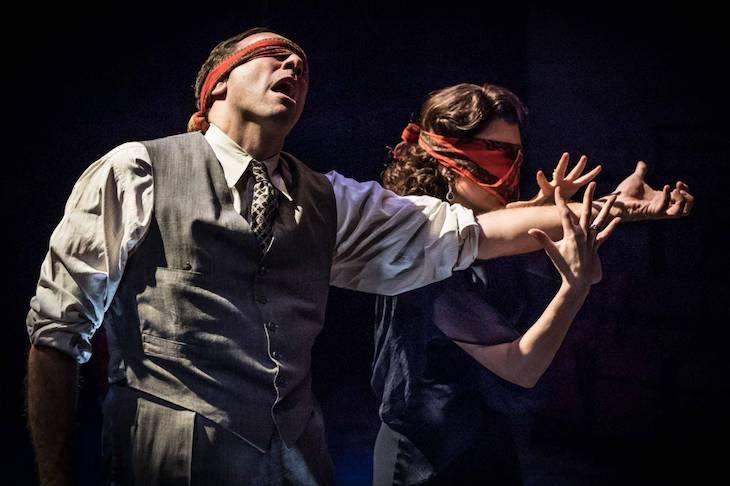Describe the Night opens in Poland in 1920 where two Russian soldiers, Isaac and Nikolai, discuss truth and falsehood. Next we’re in Smolensk, 2010, where some strangers scream at each other about a hire car. Next Moscow, 1931 (or 1937 — the surtitles are illegible), where Nikolai, now a top soldier, asks Isaac, now a successful screen-writer, to audition his wife for a movie. Isaac improvises a scene with the wife and then fondles her bottom as they perform a weirdly sexless dance that is supposed to symbolise something, but it’s unclear what because everything that preceded the dance was indecipherable. Then the interval.
I looked for enlightenment in the programme notes and discovered what the play is supposed to be about. It’s fascinating stuff. Nikolai Yezhov was a sadistic bisexual midget, dubbed ‘the poison dwarf’, who worked as Stalin’s chief torturer. His wife became the lover of the writer Isaac Babel in the 1930s and when Yezhov discovered their affair he had a rather delicious problem on his hands. He might arrest, torture and/or murder his wife’s lover at any moment. Or he might conceal his knowledge and inflict psychological torment on the adulterers ina social rather than in a penal setting.
What a premise. Imagine how Harold Pinter would have dealt with this romantic thriller. But the writer, Rajiv Joseph, creates an awful, meandering mess. And he doesn’t just ruin the Nikolai/Isaac story, he also tries to tackle the suspicious plane crash that killed Poland’s president in 2010, and he sifts through the youthful career of Vladimir Putin. But the Putin scenes, like the Nikolai/Isaac material, require advance research and are unintelligible to anyone who doesn’t know that the Russian president’s biological mother is rumoured to have been a prostitute who gave her son up for adoption. The writer is American so it’s not surprising to find Putin presented as a thuggish, hysterical sad sack embarrassed by a troubled past he can neither suppress nor escape. But it’s a vindictive, unintelligent portrait of a captivating character. And the play is marred by its stylistic uncertainty as it hops between satire, documentary, cabaret and the paranormal genre. The sprawling threads are held together by a series of insane coincidences surrounding a lost diary. My guess is that this three-hour monster was heavily researched and then dashed off in a hurry. The dialogue keeps straying away from the historical characters and turning its gaze on the writer’s pet interests: sorcery, drinking, epistemology, torture, hallucinations, literary journals and eccentric homemade dinners. And he has an irksome relish for characters who bang loudly on doors before being admitted to a scene.
Rarely have I sat through such a chaotic and whimsical script, but the writer had one piece of good fortune on his side. By stuffing his story full of pretentious complexities he made it impossible for an editor to make any cuts or revisions that might have improved things. Far easier to leave Mount Twaddle alone. Not surprisingly, Rajiv Joseph has been nominated for America’s foremost literary award. The Pulitzer curse strikes again.
Building the Wall begins with the scariest set-up imaginable in the USA. A female Democrat has to meet — oh my God! — a Trump supporter. But it’s OK. The Trump guy is locked up in jail and is about to be executed. We find out why in a confusing piece of exposition. An Islamic terror attack in Time Square was thwarted at the last minute. This prompted Trump to commissiona huge new prison to house zillions of foreign suspects. At first the President targeted Muslim terrorists but he then shifted his focus (and this is where the confusion arises) to Mexican immigrants. Poor sanitation led to thousands of deaths and the bodies were torched in industrial incinerators. Rogue emissaries arrived from the White House and clandestinely ordered the detainees to be murdered. The camp’s governor arranged for an execution chamber to be sneakily disguised as a civic building and the Mexicans were meekly ushered inside and gassed.
That’s the plot. Trump sets up Auschwitz. Which makes him Hitler, yes? Well, not according to this play. Auschwitz was endorsed by the Nazi leadership but herethe genocidal governor has been jailed by the Trump regime and given the death penalty. (The script skates over this troublesome non sequitur.) The play is disturbing for all the wrong reasons. The writer puts Auschwitz on stage to satisfy his anti-Trump feelings. But art and politics are close cousins. And if an artist can imagine a death camp in order to endorse his prejudices then an activist can erect one for the same purpose. This play offers us a glimpse into the warped mentality of the gulag builder or the religious terrorist. Anyone who believes mass murder is a permissible means of justifying their world-view will love this show. Roll up, psychos.







Comments